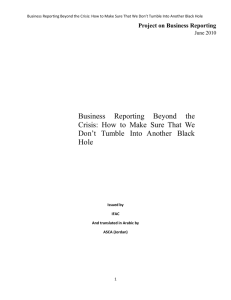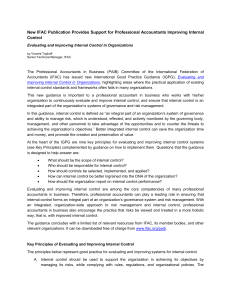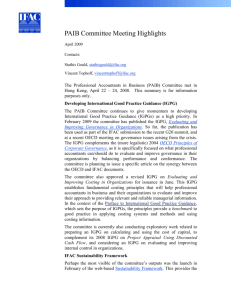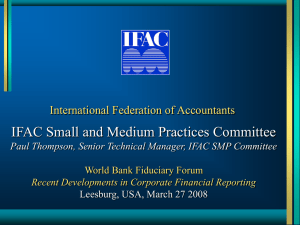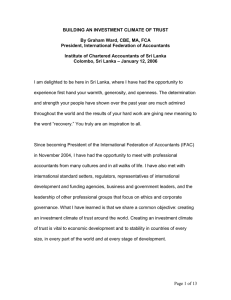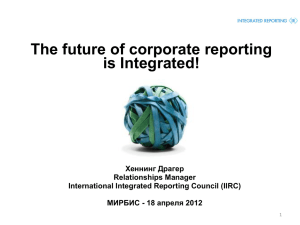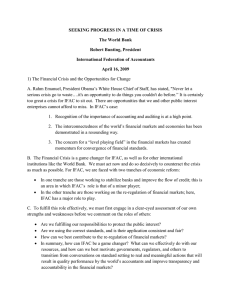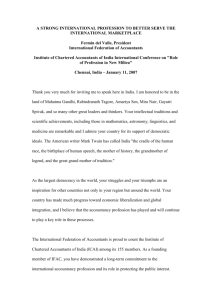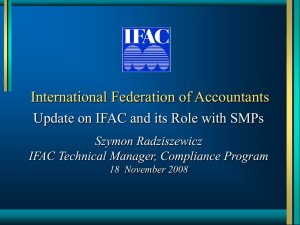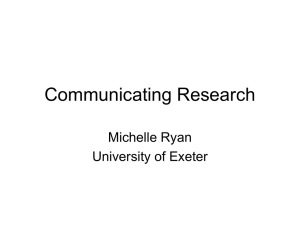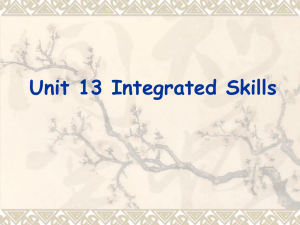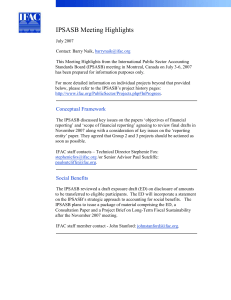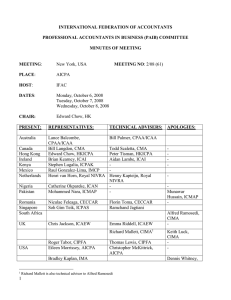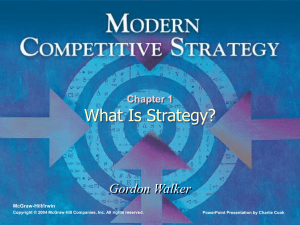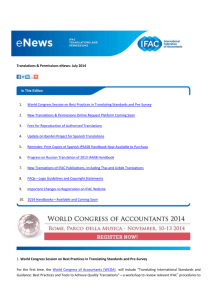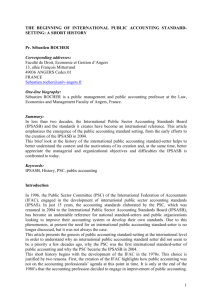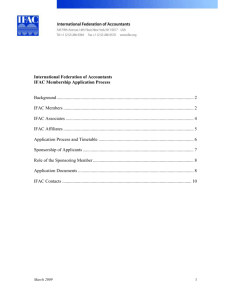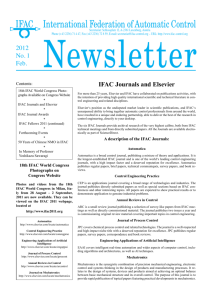Part 1
advertisement
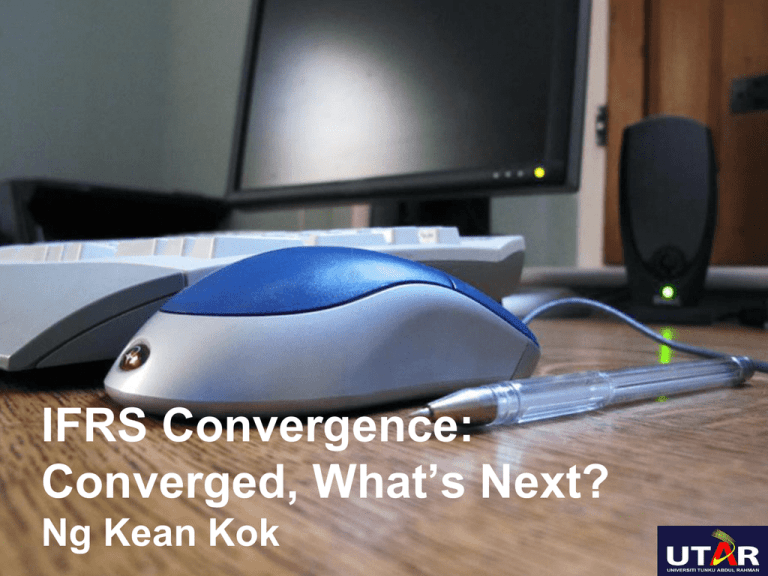
IFRS Convergence: Converged, What’s Next? Ng Kean Kok Need for accounting convergence • Accounting and reporting practices fall short of meeting information needs of the capital markets • Need for improved reporting model built on principle-based standards that can be applied in a cost-effective manner • Matter of decisive strategic importance o the future global capital markets • High quality information essential to high quality markets What do stakeholders want from annual reports? • • • • • • • • • • • Financial performance Treatment of staff Customer service Quality of management Image and reputation Quality of products Social responsibility Corporate strategy Market share Accessibility / openness to enquiry Communication – information provided What do stakeholders want from annual reports? (continued) • • • • • • Honesty / integrity Long established Valuation Cash flow Sector / industry in which they operate Environmental responsibility (Source: tomorrowscompany.com) Survey on Financial Reporting Chain – by IFAC 2007 – Financial Reporting Process Survey on Financial Reporting Chain – by IFAC 2007 – Financial Reporting Process Survey on Financial Reporting Chain – by IFAC 2007 – Financial Reporting Process Survey on Financial Reporting Chain – by IFAC 2007 – Usefulness of Financial Reports Survey on Financial Reporting Chain – by IFAC 2007 – Usefulness of Financial Reports Survey on Financial Reporting Chain – by IFAC 2007 – Usefulness of Financial Reports Integrating the Business Reporting Supply Chain – by IFAC 2011 – Improving Financial Reporting • Financial reporting must become more relevant and understandable to the various users. Organizations should provide simple building blocks of business information, grouped around topics of value to stakeholders. Consideration should also be given to the education of retail investors. • Use of a direct cash flow statement should be encouraged to allow the investor community to more clearly see the operating performance of the business and the investment decisions being made, as well as how the business is being financed. Integrating the Business Reporting Supply Chain – by IFAC 2011 – Improving Financial Reporting (continued) • Financial reporting standard setters should simplify their standards so stakeholders can understand them and implement them properly. To increase the diversity of standard-setting boards, non-accountants should be encouraged to participate on them. • The financial reporting burden on smaller and nonlisted entities should be limited. Standard setters and regulators should consider how they can reduce the burden of financial reporting for smaller and non-listed entities. Integrating the Business Reporting Supply Chain – by IFAC 2011 – Improving Financial Reporting (continued) • The use of fair value in financial reporting should be supported. Standard setters should better distinguish between the changes to the bottom line that result from changes in fair value, versus those changes that result from the day-to-day running of the business => enable stakeholders to better distinguish the true underlying performance of an organization. • Application of financial reporting standards should be more principles based in order to capture the economic substance of a transaction. Professional judgment is needed in applying principles-based standards. Financial reporting standard setters should provide sufficient room for professional judgment in their standards and regulators should establish a fair enforcement process. Integrating the Business Reporting Supply Chain – by IFAC 2011 – Improving Financial Reporting (continued) • Global capital markets would be best served by one set of principles-based, high-quality financial reporting standards. The increasingly globalized supply of capital necessitates one global set of high-quality financial reporting standards. Education should be provided to promote a swift global transition to International Financial Reporting Standards. • Professional behaviour and a minimum level of qualification should be required for preparers of financial statements. In addition, organizations should apply a rigorous recruitment and training approach for their finance and accounting staff. Integrating the Business Reporting Supply Chain – by IFAC 2011 – Improving Governance in Organisations • Good governance starts with tone at the top – Boards • Principles-based, stakeholder-driven governance codes “apply or explain” principle • Further international convergence is desirable. • More independence should be required of boards of directors (e.g. requiring over half of a board’s members to be independent NEDs; separating the positions of CEO and chairman). • Directors should competently fulfill their duties – capacity to approve the organization’s strategy, including risk management, and to evaluate the way strategy is executed and reported upon. Integrating the Business Reporting Supply Chain – by IFAC 2011 – Improving Governance in Organisations (continued) • Risk and liability for directors should be addressed. • Primary responsibility of directors is performance — not compliance. • Expand from a shareholder to a wider stakeholder perspective. Organizations have an ever-growing environmental, social, and economic impact on societies and should, therefore, take into account not only the interests of their investors, but also those of their clients, employees, suppliers, neighbours, governments, regulators, financial markets, and societies as a whole. Integrating the Business Reporting Supply Chain – by IFAC 2011 – Improving Governance in Organisations (continued) • Organizations should take social and environmental, as well as economic, performance into account. Sustainable performance is the combination of these three factors, which should be aligned with an organization’s strategies, operations, and stakeholder communications. Successful organizations demonstrate that sustainability is also good business. • Executive remuneration should be aligned with the organization’s sustainable performance relative to its competitors. Integrating the Business Reporting Supply Chain – by IFAC 2011 – Improving Governance in Organisations (continued) • Ongoing risk management and control should be a key part of board oversight. Risk management and control systems should become a key part of integrated management at every level of an organization and across all operations. • Collaborative effort is required to address systemic risk. Securities regulators, central banks, and other financial regulators across the globe should collaborate to form an empowered, supra-national oversight body to identify systemic risks in the markets and ensure a solid international financial infrastructure. Integrating the Business Reporting Supply Chain – by IFAC 2011 – Steps towards integrated business reporting • Improving business reporting should start with broadening the stakeholder perspective – should be more receptive to the information needs of various stakeholders and adjust approach to reporting accordingly. • Business leaders should present a cohesive explanation of their organization to help stakeholders assess its overall performance, which includes how their actions impact the environment. The current practice of reporting should, therefore, be expanded to a more connected way of business reporting, integrating the various social, environmental, and economic aspects of an organization into one cohesive explanation of the business. Integrating the Business Reporting Supply Chain – by IFAC 2011 – Steps towards integrated business reporting (cont’d) • Management commentary should put the numbers into context. To provide better insights into what drives the business, management commentary should be more open, transparent, and forward looking. To foster more open narrative reporting, stakeholders should change their approach and culture in regard to litigation. • A new, integrated business reporting model should be developed to present a cohesive explanation of the business so stakeholders can better assess the overall performance of the organization. A high-level, multistakeholder integrated report could be connected via information and communication technologies to more detail. Integrating the Business Reporting Supply Chain – by IFAC 2011 – Steps towards integrated business reporting (cont’d) • More continuous business reporting should be encouraged – encourage greater frequency and timeliness of business reporting => reduce the information vacuum in which stakeholders have to operate. Faster and more frequent reporting also motivates organizations to improve their internal information systems. • To remain relevant, auditors should expand the scope of their audits and provide assurance beyond the financial statements. A redefined, broadened, and more transparent reporting framework will effectively expand the need for assurance, creating new business opportunities for auditors. • Integrated Reporting being developed by IIRC • Source: www.iirc.org Integrated Reporting • Meet the needs of the 21st century • Builds on the foundations of financial, management commentary, governance and remuneration, and sustainability reporting in a way that reflects their interdependence Integrated Reporting Criticisms: • Firms focus on short-term profits and rewards at the expense of the firms’ long-term prospects and sustainability • Should demonstrate the extent to which firms’ capital market affecting decisions reflect long-term considerations, disclosing the governance systems and process that are in place and how risks are managed in firms. • Corporate reporting disclosures must adequately highlight systematic risks that affect the businesses of firms. • Today, there are many non-financial information reports relating to sustainability, such as corporate social responsibility (CSR), environmental, social and governance (ESG), corporate responsibility (CR) and environmental, health and safety (EHS) reports. • The key questions are: how does one link all these reports, financial and non-financial? What framework exists that allows for the integration of non-financial, operational and financial metrics? How are all these information linked with the firms’ business strategy and model? • The answer lies in IR Integrated Reporting Benefits of IR: Makes visible a firm’s use of and dependence on different resources and relationships or “capitals” (financial, manufactured, human, intellectual, natural and social), and the organization’s access to and impact on them. Reporting this information is critical to: • a meaningful assessment of the long-term viability of the organization’s business model and strategy; • meeting the information needs of investors and other stakeholders; and • ultimately, the effective allocation of scarce resources Entities should be providing • a more holistic picture of a company’s performance including both financial and non-financial measures • A view over the shorter and longer term about their strategy and prospects for continuing to generate value given likely constraints • Clearer and more concise reporting by including only the most material issues Integrated Reporting How is integrated reporting different? Momentum building up internationally • International convergence of accounting standards – IASB and FASB • 1. 2. 3. 4. 5. 6. 7. Work of: The Prince’s Accounting for Sustainability Project, Global Reporting Initiative World Business Council for Sustainable Development, World Resources Institute World Intellectual Capital Initiative Carbon Disclosure Project Climate Disclosure Standards Board etc Momentum building up internationally (cont’d) Some publications thus far • The IFRS Practice Statement, “Management Commentary”, an international framework for narrative reporting to provide a context for interpreting an organization’s financial position, financial performance and cash flows; • The Integrated Reporting Committee of South Africa’s Discussion Paper, “Framework for Integrated Reporting and the Integrated Report”; • The Global Reporting Initiative’s “G3.1” Sustainability Reporting Guidelines, and • the International Auditing and Assurance Standards Board’s Discussion Paper, “The Evolving Nature of Financial Reporting: Disclosure and Its Audit Implications”. Momentum building up internationally (cont’d) IAASB’S proposals: • Additional paragraph stating auditor’s responsibility - Management disclosure & analysis - Operating and financial review statements • - Auditors to provide additional assurance (separate report) on: Enterprise wide risk management Business model Internal Controls Key performance indicators Corporate governance arrangements
